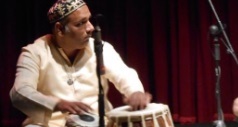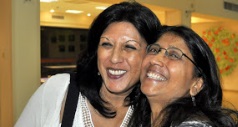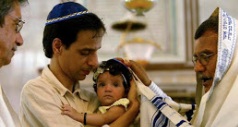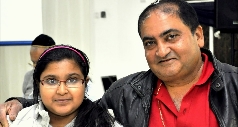BENE YACOB SYNAGOGUE (1991)
Village of Kotta Reddi Palem near Chebrole
Guntur District
Andhra Pradesh, INDIA
This is a functioning synagogue with a small yet very active congregation. The contact person is the friendly and helpful Sadok Yacobi at This email address is being protected from spambots. You need JavaScript enabled to view it.. To visit the two Bene Ephraim synagogues, it is most reasonable to travel to Vijayawada, the largest city in the State of Andhra Pradesh. To reach the two buildings, which are in separate towns a modest distance away from Vijayawada, hire a car and driver. Whereas this synagogue has a guest room available to visitors on its property, it is quite basic. For those seeking greater comfort, a stay at the Gateway Hotel (of the Taj Group) in the center of Vijayawada is suggested.
The Bene Ephraim (Children of Ephraim), one of India’s distinct communities of Jews, are a group of fifty or so families living in a handful of towns and villages in the central part of Andhra Pradesh State of southeastern India. They are also referred to as the Telugu Jews because they speak the local language of Telugu. As practicing Jews, they form part of the Mala and Madiga regional tribes made up of people of different religions and faiths, the majority Christian. These tribes were restricted under India’s ancient caste system as dalits (meaning “broken to pieces”), or “untouchables,” an institution now outlawed by the country’s constitution although problems of discrimination persist.
According to an oral history recounted by the brothers and community leaders Shmuel and Sadok Yacobi, the Bene Ephraim are of an ancient origin. In the Jewish diasporic tradition begun more than two and one-half millennia ago, a group of Jews migrated from Persia into Afghanistan, Tibet, and China before arriving over one thousand years ago in India’s northernmost region of Jammu, Kashmir as well as the Magadha Kingdom, now part of West Bengal and the Northeastern Hill States. Some of these Jews came to settle permanently in the Northeastern Hills States of Manipur and Mizoram and later took the name B’nei Menashe. Others moved south to Orissa and Telugu land, today’s Andhra Pradesh, and they came to be known as Vrathyas, the root of Ephrathias, and the derivation of Ephraim. Oral tradition also reveals that these Jews, the ancestors of the current-day Bene Ephraim, settled on the bank of the Krishna River. In time they erected a synagogue in the village of Amaravathi. Years later this synagogue was destroyed, and a Buddhist temple followed by a Hindu temple was built on the site. Excavations carried out by the Indian Department of Archeology on the site of the former synagogue affirm, according to the Yacobi brothers, some type of Jewish presence in the area through copper plates dated to the second century CE.
Nearly two hundred years ago, Baptist missionaries from the United States arrived here and converted much of the local population to Christianity. However in 1981, a small group of these Baptists decided to return to their Jewish origins. The Bene Ephraim Jews have identified certain traditional practices of the Mala and Madiga tribes, connecting them to Jews of ancient times. Although other tribes who adopted Christianity bury their dead in a north-south orientation, those of the Mala and Madiga tribes of any faith bury their dead only east-westward (in the Jewish tradition, towards Jerusalem). When a child is born, a naming ceremony is conducted on the eighth day after the birth, which also draws from Jewish convention. When a girl reaches the age of eleven years and one day, or a boy the age of twelve years and one day, there is a coming of age ceremony when the child is considered an adult. This tradition is akin to the Jewish Bat Mitzvah (for the female) and Bar Mitzvah (for the male) rituals. In the view of the Yacobi brothers, there are other Jewish customs that penetrated Telugu culture. For example, the Telugu use a lunar-solar calendar similar to that of the Jews. Shmuel Yacobi also has conducted linguistic research of the Telugu language, and he has counted many words of Hebrew and Aramaic origin.
In recent years, two Bene Ephraim synagogues have been built in central Andhra Pradesh: the Bene Ephraim Synagogue of 2005 in the town of Machillipatnam on 1, Synagogue Street, and this small building dating to 1991 in the pastoral village of Kotta Reddi Palem near Chebrole in the Guntur district. Named Bene Yacob, the congregation was founded in 1909. As with many communities, they managed for some time without a proper synagogue, conducting services in private homes, before this small building was realized. It is a rectangular structure of modest construction with simple building materials that include walls of rudimentary structural blocks neatly veneered in white chunam (polished lime and sand) and a corrugated roof with cement with deep overhangs in response to the hot and wet climate. A Magen David (Star of David) and menorah (candelabra) painted in blue decorate the front of the building walls, and an inscription panel along with the name of the congregation painted in Hebrew, English, and Telugu can also be seen at the façade.
The interior of the synagogue features chunam walls painted white above and blue below, natural stone pavers on the floor, jali (perforated) panels versus glass window units (a distinct Indian architectural nod), and an open ceiling with exposed painted metal trusses. Here the underside of the corrugated roof can be seen. Hanging from the roof trusses are ceiling fans. The perforated panels and doors allow for natural light and ventilation into the space. For additional lighting, fluorescent tube fixtures are affixed to the walls. In a departure from other Indian synagogues, the freestanding wooden tebah (bimah) with its draped edges is not centrally placed in the room but located towards the southwest corner of the place room in front of the heckal. The arched heckal is also fabricated from wood. As per synagogue custom, it is engaged in the wall closest to Jerusalem, which here is to the west.
Immediately in front of Bene Yacob is a small paved outdoor area used for community gatherings and holiday celebrations, and adjacent to the synagogue is a Bene Ephraim guest house available to visitors. This unpretentious and intimate synagogue is a special place that well serves the religious and social needs of a relatively isolated and challenged community. Many of its membership, including its guiding force Sadok Yacobi and his family, live adjacent to the synagogue or in the immediate area. Nearby the synagogue within easy walking distance is a Jewish cemetery.
The Bene Ephraim community is fiscally challenged, and they receive little support from outsiders, other than some modest donations for their building and siddurim (prayer books) donated from various Jewish organizations. The Bene Ephraim has a strong connection and devotion to Judaism, focusing on what is good and positive in their lives as both practicing Jews and fully-engaged members of a broader local society.
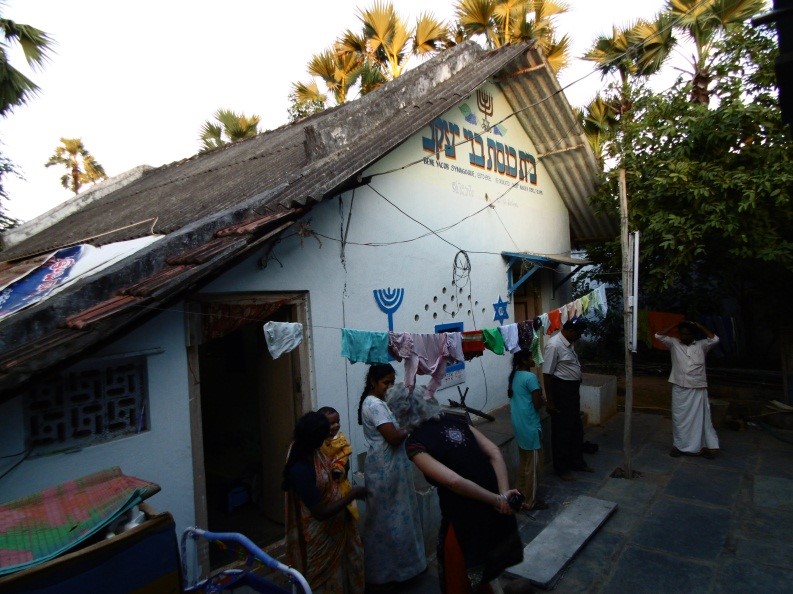
Exterior
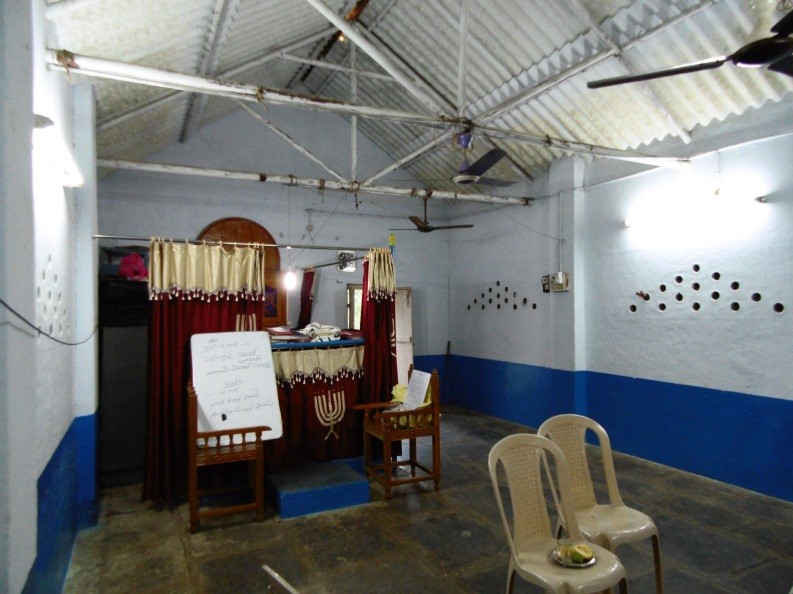
Interior

